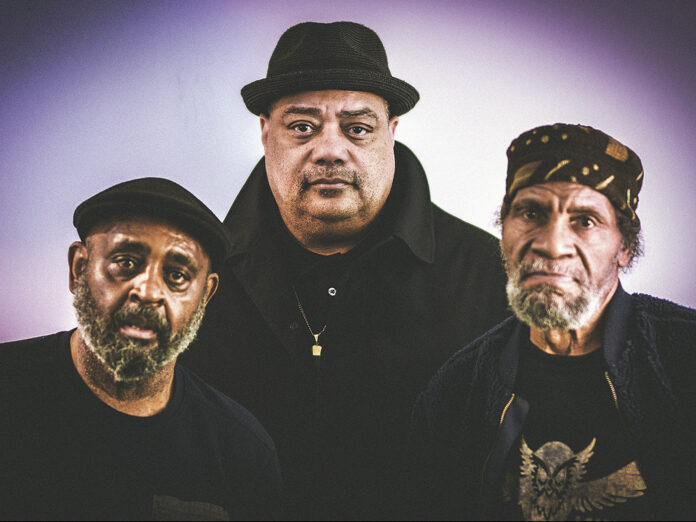For more than 55 years, The Last Poets have been documenting a dystopian world. Formed in the cultural mayhem that followed Martin Luther King’s murder in 1968, they quickly became legendary for their incendiary verses – from “Wake Up Nigger” to “White Man’s Got A God Complex” – which are always cited as an early incarnation of hip-hop. They were filled with witty, shocking and provocative lines, but the presentation was often deliberately austere. If their early disciple Gil Scott Heron would leaven his political diatribes with some soothing baritone crooning, The Last Poets denied us such bourgeois deviation: not once did they even hint at singing, and for a long time the only instrumentation that backed them was stark sound of a conga or djembe drum.
For more than 55 years, The Last Poets have been documenting a dystopian world. Formed in the cultural mayhem that followed Martin Luther King’s murder in 1968, they quickly became legendary for their incendiary verses – from “Wake Up Nigger” to “White Man’s Got A God Complex” – which are always cited as an early incarnation of hip-hop. They were filled with witty, shocking and provocative lines, but the presentation was often deliberately austere. If their early disciple Gil Scott Heron would leaven his political diatribes with some soothing baritone crooning, The Last Poets denied us such bourgeois deviation: not once did they even hint at singing, and for a long time the only instrumentation that backed them was stark sound of a conga or djembe drum.
It fitted the rather joyless ideological zone they often inhabited. On their most famous poem, “When The Revolution Comes”, they describe a utopia where “guns and rifles will take the place of poetry and essays”; where “women will be women and men will be men”; where “faggots won’t be so funny”; where you should “speak not of revolution until you are willing to eat rats to survive”. Rats, you say? Blimey. No wonder that the one segment from that track that everyone sampled was the despairing final line: “until then, niggers will party and bullshit and party and bullshit…” Partying and bullshitting certainly sounds preferable to eating rats.
“When The Revolution Comes” is one of eight early poems revived on this album. But here, instead of spartan hand percussion, they’re now upholstered by a full Afrobeat band – assorted London jazz luminaries, assembled and directed by Nigerian bassist Kunle Justice – playing the kind of confrontational, politically charged funk associated with Fela Kuti. It’s a musical genre that fits them like a glove.
This isn’t the first time they’ve featured musical accompaniment. Often the settings have been suitably bleak, like the digi-funk backing that Bill Laswell provided for several of their LPs in the 1980s and 1990s, or the brittle dub that backed 2018’s Understand What Black. Sometimes they were cerebral, like the beatnik jazz of 1972’s Chastisement, or the free improv of 1973’s At Last. But, on Africanism, the backing builds organically on the drum rhythms that they traditionally use. “Two Little Boys”, a poem about the horrors of drug abuse, starts with just a conga drum before a full Afrobeat band seamlessly kicks in after 40 seconds. It’s like a shift from monochrome into vivid colour.
The backing was actually recorded remotely – original frontmen Abiodun Oyewole and Umar Bin Hassan recorded their parts in Brooklyn, while the musicians were in London, using drum tracks that had been laid down in a Lewisham studio in 2019 by Fela’s right-hand man Tony Allen, only a few months before he died in the early weeks of the Covid pandemic.
These poems are all more than 50 years old and some have a whiff of homophobia, sexism and antisemitism about them. There is something amusingly prudish about “Gashman”, which admonishes (black) men for preferring sex to revolution (“bitches with big afros and nice bodies turning would-be revolutionaries into gashmen”); while the unchanged lyrics to “Related To What” contain references to Diana Ross, Tom Jones, Roy Wilkins, Nat Turner and Richard Nixon that almost require historical footnotes.
But all these poems sound better than ever; the irony is that, as with so much of the hip-hop that The Last Poets paved the way for, the musical backing makes the grim lyrics sound quite inappropriately exciting. A version of the apocalyptic “This Is Madness”, all wah-wah guitars and ecstatic horn freakouts, is absolutely thrilling. “New York, New York”, which regards the Big Apple with a mix of awe and horror, sees the hypnotic Afro-jazz band provide a running sonic commentary on the lyrics, including a terrific sax solo from Courtney Pine.
Oyewole and Bin Hassan have always said that their poems serve as an internal dialogue within a specific African-American community, and as such this can leave outsiders feel as if they are eavesdropping on a private argument. Does this matter? Maybe it does on the furiously funky version of “Niggers Are Scared Of Revolution”, a track that might have you grooving in your seat, hooting with shocked laughter, and possibly concerned that you shouldn’t be hearing it at all. It is as hilarious as it is disturbing and uncomfortable – the embodiment of The Last Poets at their best.
When you purchase through links on our site, we may earn an affiliate commission. Here’s how it works.



